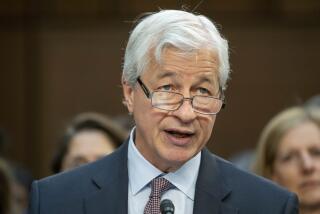Greece bank stability at risk as fear of economic disaster grows
ATHENS — Fear for the health ofGreece’s banks increased Wednesday after a rush of withdrawals as the country braces for fresh elections that could determine whether it remains part of the Eurozone.
Reports that depositors pulled out nearly $1 billion on a single day fueled warnings this week from the Greek president of a run on already shaky financial institutions. There were no lines of worried customers outside banks in Athens on Wednesday, but one analyst said a panic could easily be sparked in the country’s febrile political and economic environment.
“We’re two ticks away from a run on banks,” said Jason Manopoulos, a leading hedge fund manager. “If people were worried before, they’re getting scared now.”
The feeling of a society teetering on the edge of disaster was precipitated by inconclusive elections May 6 that produced Greece’s most fractured political landscape in decades.
No party won overall control, but a strong majority of voters backed anti-austerity protest groups, including the hard-left Syriza, which has sent shock waves through the global markets with its pledge to shred the bailout agreements that have kept Greece afloat financially.
With the parties unable to agree on forming a unity government, Greece on Wednesday named an emergency prime minister, Senior Judge Panagiotis Pikrammenos, who will preside over a caretaker administration until crisis-weary voters go to the polls for a second time June 17.
The new elections are increasingly being cast as a referendum on whether the country should — or can — remain a member of the Eurozone, the group of 17 nations that use the euro. Senior European officials have warned that a new government bent on turning its back on the country’s bailout obligations would essentially hasten a Greek exit from the currency union.
But there were signs Wednesday that some European leaders might be trying to soften the hard line on Greece and the recent flurry of comments out of Brussels, Berlin and other capitals that expelling Greece from the Eurozone would be manageable.
German Chancellor Angela Merkel, the woman many Greeks blame for their problems because of her insistence on harsh austerity as the answer to Europe’s debt crisis, said in an interview with CNBC that she had “the will, the determination, to keep Greece in the Eurozone.”
“I think it will be good for Greece and good for all of us.”
Although she said spending cuts still had to be made, Merkel hinted that she would be willing to consider ways to stimulate the Greek economy, which is on track for a breathtaking 20% contraction during the last five years of recession.
Still, the sense of peril here has deepened with the reports of money being pulled out of Greece’s tottering banking system at an alarming rate.
Since the start of the debt crisis here 2 1/2 years ago, depositors have withdrawn cash from the banks at a steady pace, to stuff under mattresses or send abroad. But the recent turmoil caused by the May 6 elections, and the stark warnings that Greece might have to leave the Eurozone and reintroduce its former currency, accelerated the outflow.
President Karolos Papoulias told squabbling political leaders Tuesday that about $900 million had been taken out of the banks the day before.
Greek banks held about $200 billion in deposits in March, according to the country’s central bank. But in another ominous development, Reuters reported Wednesday that the European Central Bank had stopped helping to finance some Greek banks because of their solvency problems.
Special correspondent Carassava reported from Athens and Times staff writer Chu from London.
More to Read
Start your day right
Sign up for Essential California for news, features and recommendations from the L.A. Times and beyond in your inbox six days a week.
You may occasionally receive promotional content from the Los Angeles Times.







